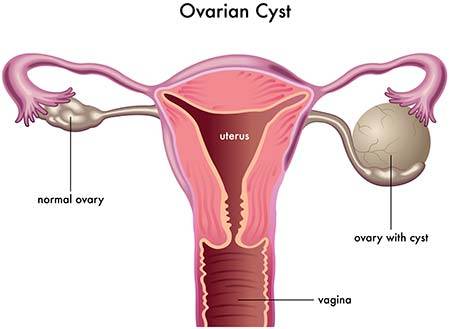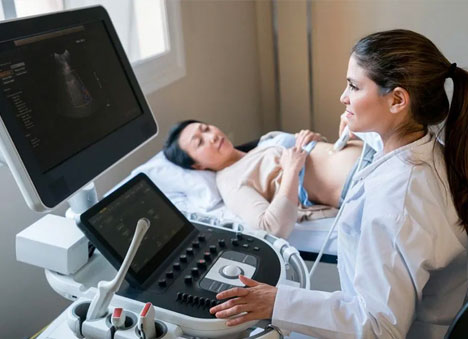Ovarian Cysts
 A cyst is a sac or pocket filled with fluid, solid matter or a mixture of both. A cyst can appear almost anywhere in your body. When a cyst appears on one of your two almond-sized ovaries, it’s called an ovarian cyst. Ovarian cysts usually form during the ovulation part of your cycle, when your ovaries release the ova. Most women experience cysts at some point in their lives without knowing it.
A cyst is a sac or pocket filled with fluid, solid matter or a mixture of both. A cyst can appear almost anywhere in your body. When a cyst appears on one of your two almond-sized ovaries, it’s called an ovarian cyst. Ovarian cysts usually form during the ovulation part of your cycle, when your ovaries release the ova. Most women experience cysts at some point in their lives without knowing it.
Cystic Symptoms
Cysts usually present with few or no symptoms, and they don’t usually cause any harm. Cysts disappear independently, typically within a few months, leading to most gynecologists taking a “wait and see” approach. However, the symptoms of a ruptured cyst include sudden, intense pain.
Significant and severe pain can also signal a cyst causing the ovary to twist, called ovarian torsion, and a surgical emergency. Concerning symptoms, you should always be evaluated by a physician with a thorough consultation and examination for an accurate diagnosis and treatment plan as it may be a symptom or sign of a severe illness or condition.
Because an ovarian cyst can rupture if your doctor doesn’t monitor its growth, you should note the telltale signs that can accompany a cyst:
- A feeling of pressure, bloating, swelling, or pain (sharp or dull) in your lower abdomen that comes and goes
- Pelvic pain
- Lower back pain
- Difficulty emptying your bladder
- Pain during sex
- Unexplained weight gain
- Atypical pain during your period
- Vaginal bleeding that is in some way not typical for you
- Breast tenderness
- Feeling the need to urinate more frequently
If you’ve already been diagnosed with an ovarian cyst and you experience any of the following symptoms, please seek medical help immediately:
- Pain accompanied by fever and vomiting
- Sudden, severe pain in your abdomen
- Feeling faint or dizzy
- Shortness of breath or rapid breathing
Gynecologist of Manhattan Women’s Health & Wellness offers comprehensive Obstetrics & Gynecology care in New York City for women of all ages. At our ob-gyn clinic, we provide a full range of gynecology services, from annual check-ups and routine pap smears to treatment of cysts and GYN procedures, surgeries performed in our office or the hospital. Our state-of-the-art Manhattan gynecology center has the latest gynecological equipment.
Why Do You Get Cysts?
Hormonal changes often cause cysts to grow, particularly with the use of infertility drugs. Pregnancy can also induce a cyst form. Most cysts do go away on their own, but monitoring them until they do can be critical.
Most cysts in the ovaries can be followed with ultrasound alone and don’t need surgery.
Severe pelvic infections can spread to your ovaries and fallopian tubes, with cysts forming as a side effect. Additionally, endometrioma is cysts that develop if you have endometriosis. The endometrium, or the lining of your uterus, grows over your ovary, causing a cyst to form. These cysts are the ones that can cause pain during your period or while having sex.
Confirming a Cyst

Midtown and Upper East Side gynecologist may feel a cyst with a pelvic examination. Sometimes, a cyst is too small to find, but if the symptoms fit, your gynecologist may perform specific tests to be sure. For example:
- Ultrasounds, allow to see your internal organs and reveal cysts, including their number, size, shape, location in or on your ovaries, and what they have inside:
- Cysts full of clear fluid usually go away on their own.
- Larger cysts, especially if they are more solid, may not go away independently and must be examined more closely.
Cysts that go unchecked can go from being managed in the office into a surgical emergency.
An ultrasound also tells the doctor if a cyst is septated or not — that is, a cyst that has segments. With a septated ovarian cyst, the doctor pays close attention to the depth of the walls dividing the segments since the thicker the wall, the higher the chance of malignancy.
- Pregnancy tests can rule out a cyst that has developed due to conception.
- Hormone level tests can tell if any of your hormone levels are off, which may have instigated the formation of a cyst.
- Blood tests are common with both post-menopausal women and younger women, but for different reasons. A post-menopausal woman is less likely to have a cyst and more likely to have ovarian cancer, which a blood sample can help detect. Conversely, blood tests for younger women intend to catch a variety of other diseases as well.
What Type of Cyst Do You Have?
Ovarian cysts typically form during your menstrual cycle. They’re often referred to as functional cysts for this reason. They’re usually benign.
There are several types of benign ovarian cysts:
- Follicular cysts are released eggs that, instead of bursting free, get trapped in the follicle. The follicle then grows into a follicle cyst, which often has no symptoms and goes away independently.
- Corpus luteum cysts result from follicles that reseal after releasing their egg, forming a sac that fills with fluid. Like follicular cysts, these cysts go away on their own after a few weeks. There is, however, the possibility that these cysts may either bleed or twist the ovary painfully. Sometimes, as these cysts grow, blood vessels rapidly form to feed them. If one of the new thin blood vessels tears, blood pools in the cyst, creating a hemorrhagic cyst.
- Endometrioma cysts are common in women with an endometriosis diagnosis. Endometriosis causes uterine lining tissues to grow outside the uterus, including in the fallopian tubes and ovaries. When this happens to form a pocket, it can become a cyst.
- Dermoid are cysts that develop from cells that were already present at birth. These cysts typically do not have symptoms or complications.
- Cystadenomas are cysts that are filled with watery fluid and can grow to be quite large.
- Polycystic ovary syndrome (PCOS) causes a cluster of small cysts. While cystic ovaries are benign, PCOS can cause problems when trying to get pregnant. Suppose you have been diagnosed with PCOS or have concerning symptoms. In that case, you need a thorough consultation and examination by a PCOS specialist for an accurate diagnosis and treatment plan.
While most ovarian cysts are benign, malignant cysts can happen and are prevalent in older women. A physician should evaluate ovarian cysts with a thorough consultation and examination for an accurate diagnosis and treatment plan. It may be a symptom or sign of a severe illness or condition. Additionally, there are ovarian cysts during pregnancy. An ovarian cyst during pregnancy isn’t unusual. They’re primarily benign, and most gynecologists consider them harmless. If the cyst continues to grow during the pregnancy, your gynecologist closely monitors it in anticipation of problems during childbirth.